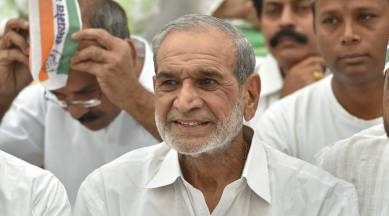Stay updated with the latest - Click here to follow us on Instagram
Anti-Sikh riots: Delhi HC seeks Centre’s response on Sajjan Kumar’s reply in plea opposing bail granted to him
The HC granted four weeks to the Centre to respond to Kumar's reply and listed the matter on March 21.

The Delhi High Court Friday sought the Centre’s Special Investigation Team’s response to former Congress MP Sajjan Kumar’s reply in the SIT plea challenging a trial court order granting bail to him in connection with the 1984 anti-Sikh riots.
A single judge bench of Justice Dinesh Kumar Sharma was hearing the case wherein Kumar’s counsel Anil Kumar Sharma submitted that “he had filed his reply to the SIT’s plea in July and, till date, no response has been filed”. He further submitted that there “are no reasons given or a case made out against his client”. The counsel for the Centre submitted that it would like to respond to Kumar’s reply as there are certain statements made therein which are “factually incorrect”.
monthly limit of free stories.
with an Express account.
After hearing both parties, the HC granted four weeks to the Centre to respond to Kumar’s reply and listed the matter on March 21.
A trial court on April 27 had granted bail to Kumar in connection with the killing of a man and his son during the riots, noting that his name was first taken by the complainant after seven years. In July, the HC had stayed the bail order after the Centre argued that Kumar was involved in a heinous offence and since some important witnesses are to be examined, releasing him may hamper evidence.
A case was registered against Kumar in December 1991 at Saraswati Vihar police station. Earlier, the Delhi Police riot cell was investigating the case which later closed in 1994. In 2015, a three-member SIT constituted by the Centre to reinvestigate riot cases decided to reopen the case. The mandate for the SIT was to reinvestigate “serious criminal cases filed in Delhi in connection with the 1984 riots which have since been closed”. The SIT was to examine records afresh from police stations concerned and file a chargesheet against the accused in the proper court where, after investigation, sufficient evidence is found available.
The SIT in its plea contends that it examined the complainant of the 1991 FIR who said it was Kumar who formed an unlawful assembly armed with deadly weapons for the purpose of committing criminal acts including rioting arson and murder. The complainant, who had also filed an affidavit before the Justice Ranganath Misra commission of inquiry, had clearly mentioned Kumar’s name as the person who instigated the mob. She said her “husband and son were killed and burnt on November 1, 1984, after a mob attacked her house”. She said “rioters led by Kumar attacked Sikhs in order to kill them in which her husband Jaswant Singh and son Tarundeep Singh were killed”.
The SIT filed a chargesheet in April 2021. It has contended that while granting bail to Kumar, Additional Sessions Judge MK Nagpal “did not consider the reply filed by the SIT and did not appreciate relevant facts and established position of law”. The SIT claims the trial court “wrongly observed” that there is no threat to victims when the victim–wife of the deceased has specifically stated that Kumar is an influential person and she apprehends “threat in future if the case is pursued”. The SIT further claims that in the bail order, the trial court has given a “finding on the merits of the case” when at the time of bail only a “prima facie case has to be seen and no evaluation of evidence is to be done”.
Kumar on the other hand responded that the affidavit filed by the complainant before the Justice Ranganath Misra commission of inquiry does not assign any “role either directly or indirectly to Kumar in any manner”. The reply states, “The prosecution in their entire investigation could not obtain any further evidence, oral or documentary, when after making all efforts/sources available with the SIT. It could not find any evidence against respondent/accused, SIT has filed the chargesheet with fresh allegations which was never the object of the Committee and Law”.
Kumar further said the argument that he is an influential and politically powerful person who can be a threat to prosecution witnesses or can influence them has no substance or force. He has contended that the only material consideration in such a situation is whether the “accused would be readily available for his trial and whether he’s likely to abuse the discretion granted in his favour by tampering with the evidence”.